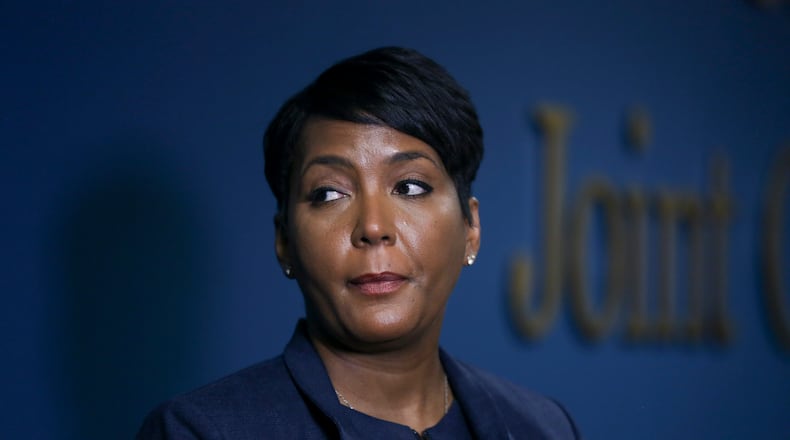Atlanta Mayor Keisha Lance Bottoms’ stunning Thursday night announcement she won’t run for reelection came as the city faces a homicide rate topping that of this time last year - a historically deadly one in Atlanta.
Authorities investigated 157 homicides last year, the most since 1996, and the violence remains unrelenting. Homicides are up roughly 60 percent from this time last year. Most recently, a series of shootings last weekend left two dead, including a 15-year-old.
The announcement came a couple of days after Bottoms held a news conference to address the city’s persistent crime problem. She said then that she’d form a committee to gather input; it’s unclear if the group, which was to have provided suggestions within the next 30 to 45 days, will actually take shape.
Bottoms’ decision to step away also comes as the city’s Civil Service Board reinstated the officer charged in the shooting death of Rayshard Brooks in June 2020 in the parking lot of a Wendy’s near downtown. Bottoms swiftly announced the firing of Officer Garrett Rolfe after the shooting, but the board found the city failed to follow its own policies in doing so.
During a virtual news conference, Brooks’ family’s attorneys focused on the procedural errors.
“We find it mind-boggling they weren’t aware of the proper procedure,” said attorney Chris Stewart. “Was that done to temporarily pacify the protesters and people around the world who were upset?”
In a statement, Bottoms defended her decision to immediately fire Rolfe.
“Given the volatile state of our city and nation last summer, the decision to terminate this officer, after he fatally shot Mr. Brooks in the back, was the right thing to do,” she said. “Had immediate action not been taken, I firmly believe that the public safety crisis we experienced during that time would have been significantly worse.”
Bottoms drew national acclaim with her impassioned remarks last year as protesters outraged at George Floyd’s death in Minneapolis. (Former Officer Derek Chauvin was recently found guilty of murder and manslaughter).
“When I saw the murder of George Floyd, I hurt like a mother would hurt,” Bottoms said as she urged demonstrators to go home that night in May 2020. Instead, protests devolved into chaos, with businesses ransacked, windows smashed and shelves looted in both downtown and Buckhead.
Bottoms faced criticism in her handling of the site where Brooks died. He was shot after a struggle with police officers who were attempting an arrest for suspected DUI after administering a Breathalyzer test. Brooks struck Officer Devin Brosnan (doctors at Grady Hospital determined after the incident he suffered a concussion), grabbed his Taser and aimed it at Rolfe, who then fired.
Following Brooks’s June 12, 2020 shooting death, protesters camped out at the restaurant, calling for an end to police killings of Black people. Bottoms and other city officials let them stay there.
On July 4, 2020, gunmen fired into a car 8-year-old Secoriea Turner was riding in when the car encountered an authorized blockade near the Wendy’s where Brooks was shot. The child died in her mother’s arms.
Months later, attorneys for Secoriea’s family announced legal action against the city and Bottoms.
“They knew there were armed vigilantes blockading a public street,” attorney Mawuli Davis said in a news conference then. “They took no action.”
Authorities are still searching for suspects in Secoriea’s shooting death.
PAST COVERAGE:
About the Author
Keep Reading
The Latest
Featured


